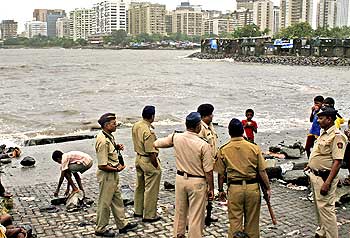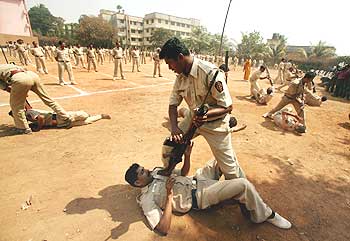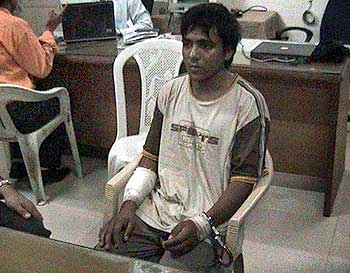Photographs: Reuters
In this concluding part of his interview, the city's top cop assures citizens that they are "100 per cent safe."
What are you doing to improve the poor level of intelligence about terrorist activities?
We are not poor, I will not buy this accusation at all. The Maharashtra and Mumbai police forces are different. The Mumbai police's intelligence is limited to what is happening in Mumbai.
What happened in Pakistan and how terrorists came through international waters are matters to be looked into by the Navy, Coast Guard and other agencies.
Whatever is happening in Pakistan is known to the agency, I don't want to name it, but they are supposed to tell us what happened there. You can't blame local police for the Mumbai attacks.
I know what is happening in my galli (lane). I know what all is happening to (fugitive gangster) Dawood (Ibrahim)'s brothers and others. I am in control. I am in charge of the city and we will control law and order.
But if you ask me what is happening in Muridke or elsewhere in Pakistan occupied Kashmir, how do I answer you? Sorry, madam, this is not my job.
After the Mumbai attacks the city lost its confidence. Anybody can come into the city from anywhere and mount a ruthless attack. That emotion of fear has to go. In between has come the report that even an air strike is possible on Mumbai.
Just because confidence building measures are being done does not mean that nothing will happen anywhere in the world. India is no exception. We are surrounded by hostile neighbours.
How can we say we will seal 720 km of Maharashtra's sea border? That also doesn't mean that we can allow blatant things like landing in Cuffe Parade (in south Mumbai) and walking up to the Taj Mahal hotel. That is why we have taken sure steps to stop such things.
We have created the Sagari Suraksha Dal, held meetings with fishermen. We are creating a system of reporting to us. However, you didn't allow me to brief you fully on intelligence, you jumped to another question.
Please tell us.
For better intelligence we have directly recruited 150 assistant intelligence officers. Already 50 have been trained and sent to various places in Maharashtra. One more level, of 82 senior intelligence officers, has also been recruited.
Around 12,000 had applied, out of them we selected 82. Out of the 82 there are 26 women who opted to become IO. They are being trained in a state-of-the-art intelligence academy built at a cost of Rs 15 crore (Rs 150 million) in Pune. It is comparable to any similar school. We have looked around, trained people and given them postings.
You very well know all over the country there is a vacancy in intelligence postings. It is not a job that people jump at. You know at what price people pay to get police jobs. However, the intelligence issue is worked out and is gathering momentum.
Q: Your priorities? A: 'Terrorism, terrorism, terrorism'
Image: Mumbai police personnel demonstrate self-defence skills as part of their makeoverPhotographs: Punit Paranjpe/Reuters
Of course! 100 per cent! When I say an attack can happen anytime and we should be alert 360 degrees, that doesn't mean that we are unsafe. We are absolutely safe.
Our antenna is up, we are checking and reading signals.
If any incident takes place then our response will be much better and much faster than the last time. We are more organised.
You asked me, am I safer? This question should be asked by all citizens: 'Am I safer?' We are doing a lot of CBMs (confidence building measures). We are meeting mohalla (local area) committees, Ganpati mandals in hundreds.
Our take is that the citizen must be more alert than before.
There are six million people travelling by train daily. There are 12 million eyes watching what is happening. Surely, we get alerts.
We are putting in place an alert citizen programme, once again. (Advertising agency) Lintas is helping us. The telephone number is 23633333. The other number, 100, is also there. Our GIS and GPS are very much in place in the control room. If there is a call from anybody we will take minimum time to respond.
When you call from your house we will know the location, then we will see how many vehicles are around that location. Americans have 911. We also have that. Whoever calls will be calling for help so s/he will give the location as well. If that happens my response will be faster.
If you take a panoramic view, a broader view of the Mumbai police commissioner's job, which are the top three to five items on your agenda?
Terrorism, terrorism and terrorism. I have opened a youth Web site: http://copconnect.in
I meet youth personally and address many meetings in colleges.
My personal e-mail ID is known to everybody: cpmumbai09@gmail.com and dsiva100@gmail.com
We want people to be alert.
When I was in the crime branch my experience is that 85 per cent of the calls are hoax calls.
Mumbai is an unwieldy city for the police even in normal times. Tell us, how are the ground realities?
If you compared Mumbai of 1998 when there were 101 shootouts in a year, Mumbai is calm.
Recently, there was one shootout, but that's all right. It was related to the Dawood Ibrahim and Chotta Shakeel gangs.
What I would like to say is that organised crime is very much under control in Mumbai. The diamond industry or film industry or exporters are not complaining against any gangs.
We are doing our best. If there are incidents and rumblings then we are announcing through you that the people should come forward and tell us.
Do you think Dawood Ibrahim's network is still operating in Mumbai?
I don't know. But if we come across it we will definitely take action against it.
What about Riyaz Bhatkal, co-founder of the Indian Mujahideen?
We will certainly track him down.
How are you prioritising your work?
Terrorism, terrorism and terrorism.
'Our investigations have not revealed any local link to 26/11'
Image: The lone surviving terrorist, Ajmal Kasab, in custodyWe have no knowledge of it. Our investigations have not revealed any link. It is not that we are suppressing any known information.
If we say there is a local link then the next question will be, who are they? What have you done about them? Where is the evidence? Why have they not been taken to court?
Who will answer those questions?
Some four years ago we had reported about the many Inter Services Intelligence modules in Mumbai and the interiors of Maharashtra. It was also said that those Indians who go to the Gulf countries are their targets and some of them are being brainwashed.
ISI modules could be there, but the various agencies put together are trying to unearth these modules. We continuously checks hotels, slums. We do nakabandi (checks at road blocks). Our intelligence agencies are working on locating sleeper cells.
How have you modernised the functioning of the Mumbai police?
Computers are very much there. Our suburban offices send messages through e-mail and not files. We send notices through e-mail. All police stations are wired. Our GPS is working. Our vans are equipped with mobiles and even Motorola-Ericsson systems. This is an ongoing thing.
In 1995 when I put in the P3 system it was a great achievement, but now it is outdated.
Is your budget adequate for your needs?
Whenever we ask the government they are very willing to help. We have to go to the government with convincing proposals. Then the government does release money.
How respectful is the police job in society?
I told you, when we advertise for 82 posts in the intelligence department of non-uniform category 12,000 graduates and post-graduates applied. In that job there is no income, no uniform and (no possibility of) corruption, no extortion, still they came!
Even for the uniformed jobs, if I have 1,000 vacancies I expect 85,000 to 100,000 people to apply.
Do you have any creative ideas to curb corruption in the police force?
The image of the police is my priority. I am building their morale. In all my presentations I harp upon treating women, minorities, children and senior citizens respectfully.
I do tell them about corruption. The number of cases of corruption is less, but the publicity about our work is also less.
The other day I was on a Doordarshan programme when a question was asked about corruption. I said India is at number seven or five in corruption ratings. Do you think it is because of the police in India? Have only we contributed to it?
I am not washing my hands off it. But we live in a social milieu where everybody is corrupt and the policemen are also corrupt.
How do you find Mumbai of 2009?
I am finding Mumbai 2009 much more attractive than the Mumbai of 1976 when I joined.
Because it is much more challenging. My predecessors like Julio Rebeiro, their challenges were totally different. In 1998 I did a good job in controlling organised crime, now if I do a good job in controlling terrorism, it will be appreciated more.
For a policeman, what can attract us more than public acclaim?
In this city something is always happening. On Shabb-e-Baraat lakhs (hundreds of thousands) of people come on the streets late at night. For Ganpati, a million is a wrong word to use, but so many come out on the streets.
Mumbai is a challenge and makes my adrenaline flows like anything.
There is a divide among communities for a few years. It pains me, but it is not created by us. It has been created by the political forces.
When gold control came, smuggling started. Arms control came and ammunition started coming from across the border. Narcotics mafia came and then land control created the land mafia and now water will be controlled and the water mafia will come up.
But no place in the world will give you in return the amount of public acclaim than what Mumbai gives.
Amitabh Bachchan started his career here, Shah Rukh Khan came here and started his career in a humble way. The same is my story. I came here as a humble policeman. I worked hard with sincerity and reached here. What else can you expect from Mumbai?




article